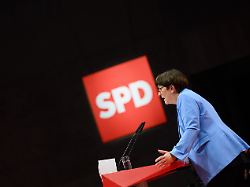“Use AfD language”
Esken calls the CDU under Merz “extremely dangerous”
December 28, 2023, 7:28 a.m
The Union is agitating against the traffic lights “in chorus with the AfD,” said SPD leader Esken at the beginning of December. CDU chairman Merz calls her statements “vile” and “dishonorable.” Nevertheless, the social democrat continues.
SPD leader Saskia Esken has described the CDU under its chairman Friedrich Merz as “extremely dangerous” for social cohesion and accused it of using the language of the AfD. “Friedrich Merz’s CDU is developing in a way that I find questionable for a party that has been responsible for many years,” said Esken. She leads debates about migration or citizens’ money, for example, in a way that pits people against each other.
“This is extremely dangerous for political culture and social cohesion,” said Esken. “It is just as dangerous when the CDU and CSU bring terms into the debate that were previously used exclusively by the AfD.” This concerns the devaluation of the government, but also the devaluation of people. “I’m thinking of the insinuation of “social tourism”, the “little Pashas” or other linguistic derailments. Something like that is poison for our country.”
Esken emphasized that this was precisely why she had already sent clear words to Merz at the SPD party conference. At the beginning of December, the SPD leader accused the CDU and CSU of “rushing against the traffic lights in unison with the AfD.” Merz described the choice of words as “disgraceful” and “vile”. Esken simply said that she “notes how intensively he (Merz) followed our party conference.”
“Populist attacks” in foreign policy
However, Esken did not take back any of her allegations in the dpa interview. On the contrary: She also accused the Union of behavior that was detrimental to the state in foreign policy: “The way in which fundamental opposition is pursued here, for example the government repeatedly does so in public in an exceptional foreign policy situation such as Putin’s attack on Ukraine is presented as hesitant and hesitant and not (as) responsible and prudent: I consider that to be politically irresponsible and it is damaging our country.”
In the past it was a given that the opposition and the government would stand together on foreign policy issues. “The CDU seems to have lost this part of our political culture. No government before this one had to put up with such populist attacks in such a crisis situation.” The SPD leader pointed out that “at the same time, leaders from all over the world such as the US President or the Ukrainian President himself attest to the Federal Chancellor that he is on their side and that he is able to forge international alliances that no one else would have achieved.” .
Nevertheless, offer of cooperation to Merz
Esken nevertheless offered the Union cooperation. “In principle, we are always ready to work with a constructive opposition.” However, the SPD leader criticized Merz for terminating cooperation with the traffic light government on the issue of migration. “Mr Merz should appreciate that compromises are made and not repeatedly demand a willingness to work together and then cancel it again,” she said. “On our side and especially on the government’s side, it still exists.”
At the beginning of September, Chancellor Olaf Scholz proposed a German pact to the Union to modernize the country and also met with Merz for discussions on the subject of migration. After the federal and state governments agreed on measures against irregular migration, Merz declared that cooperation on the issue had ended at the beginning of November. Scholz refused to set up a joint working group between the government and the Union to control immigration, he said as justification. “In my opinion, the German pact on migration is now over.”
